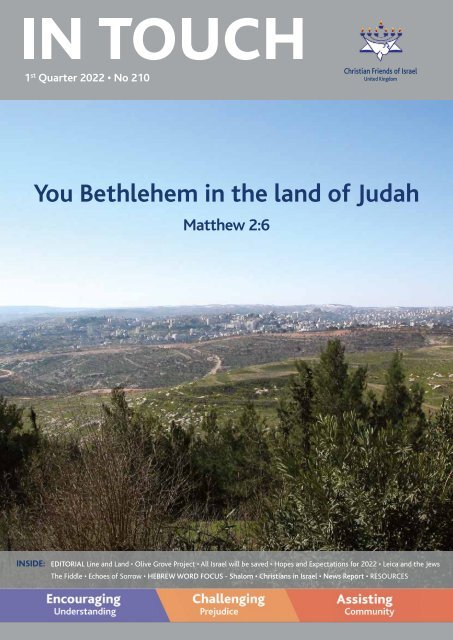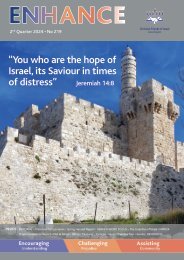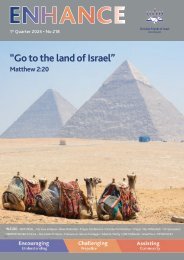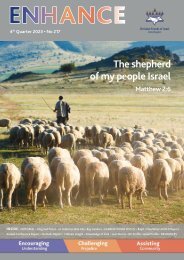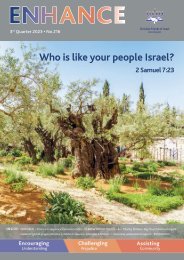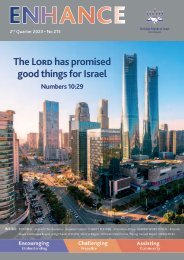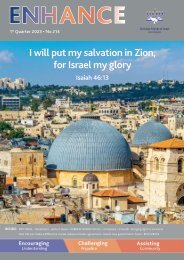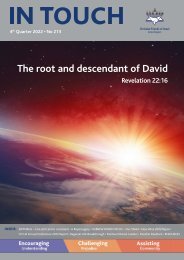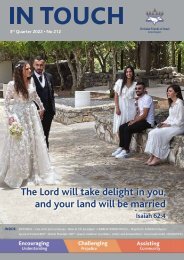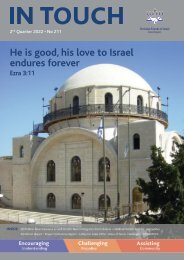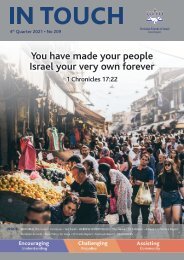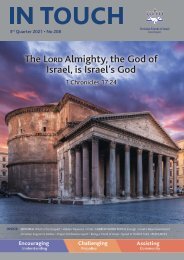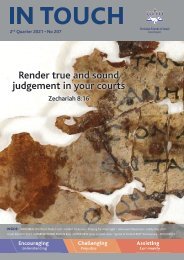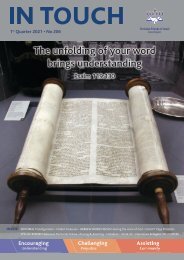In Touch - 1st Quarter 2022
Articles on: the continuing biblical story of the Line and the Land; restoring to wholeness (shalom); Christians in Israel; the Leica camera and the Jews; what the Apostle Paul meant when he wrote, 'all Israel will be saved'; the special story of one particular fiddle; CFI UK’s new Echoes of Sorrow exhibition; and Yair Lapid's aim to establish a coalition of nations opposed to a nuclear Iran.
Articles on: the continuing biblical story of the Line and the Land; restoring to wholeness (shalom); Christians in Israel; the Leica camera and the Jews; what the Apostle Paul meant when he wrote, 'all Israel will be saved'; the special story of one particular fiddle; CFI UK’s new Echoes of Sorrow exhibition; and Yair Lapid's aim to establish a coalition of nations opposed to a nuclear Iran.
- No tags were found...
Create successful ePaper yourself
Turn your PDF publications into a flip-book with our unique Google optimized e-Paper software.
1 st <strong>Quarter</strong> <strong>2022</strong> • No 210<br />
Christian Friends of Israel<br />
United Kingdom<br />
You Bethlehem in the land of Judah<br />
Matthew 2:6<br />
INSIDE: EDITORIAL Line and Land • Olive Grove Project • All Israel will be saved • Hopes and Expectations for <strong>2022</strong> • Leica and the Jews<br />
The Fiddle • Echoes of Sorrow • HEBREW WORD FOCUS - Shalom • Christians in Israel • News Report • RESOURCES
Christian Friends of Israel<br />
United Kingdom<br />
Editorial<br />
Jacob Vince<br />
The Bible-story<br />
continues –<br />
Line and Land<br />
About us<br />
CFI UK seeks to bless Israel by<br />
means of practical and moral<br />
support, and to serve the Church in<br />
teaching about God’s purposes for<br />
Israel and the Hebraic heritage of<br />
our faith.<br />
CFI UK also produces a monthly<br />
Prayer Letter, a weekly audio Middle<br />
East Report and distributes the<br />
Haverim teaching CDs.<br />
Please contact us for full details<br />
of projects in Israel and also the<br />
teaching resources available.<br />
As an educational charity, we carry<br />
a variety of resources relevant to<br />
our purpose. We do not necessarily<br />
endorse every view expressed by<br />
our guest writers or authors.<br />
IN TOUCH Magazine<br />
Published by:<br />
CFI Charitable Trust<br />
PO Box 2687<br />
Eastbourne<br />
BN22 7LZ<br />
Tel: 01323 410 810<br />
Email: info@cfi.org.uk<br />
www.cfi.org.uk<br />
Registered Charity<br />
No. 1101899<br />
Registered Office c/o<br />
Caladine, Chantry House<br />
22 Upperton Road<br />
Eastbourne, BN21 1BF<br />
Company No: 04984515<br />
VAT Registration No: GB678780275<br />
facebook.com/cfiuk<br />
twitter.com/cfi_uk<br />
youtube.com/cfiuk<br />
Front cover photo:<br />
Bethlehem from the north<br />
Two themes concurrently<br />
permeate the Bible from<br />
its earliest pages. A<br />
hereditary line and a future<br />
land are covenant promises<br />
made to Abraham, confirmed to<br />
Isaac and to Jacob.<br />
They progress through the pages<br />
of the first three parts of the Bible,<br />
the Law, the Prophets and the<br />
Psalms, which end with the books<br />
of Esther, Daniel, Ezra, Nehemiah,<br />
and the summary book Chronicles.<br />
These feature the theme of the<br />
hereditary line in recounting the<br />
genealogies and the theme of the<br />
land, in the edict of Cyrus and its<br />
implementation. The question is<br />
whether these two themes continue<br />
in the final, fourth part of the Bible,<br />
the Apostles’ teaching.<br />
<strong>In</strong> God’s providence, Matthew<br />
is tasked with writing the<br />
continuing story at the beginning<br />
of the Apostles’ teaching. Perhaps<br />
illustrative of this position, his<br />
book is structured in five sections,<br />
similar to the Law of Moses<br />
comprising five books, Joshua the<br />
first book of the Prophets, also in<br />
five parts, and the Psalms in five<br />
books.<br />
Matthew commences his<br />
continuing story, ‘A record of the<br />
genealogy of Jesus Christ the son of<br />
David, the son of Abraham’ (Matthew<br />
1:1) immediately connecting with<br />
the genealogies of Chronicles. The<br />
family tree is divided into three<br />
and summarised at the end, ‘There<br />
were fourteen generations in all from<br />
Abraham to David, fourteen from<br />
David to the exile in Babylon, and<br />
fourteen from the exile to the Christ’<br />
(Matthew 1:17). Within both the<br />
genealogy itself and the summary,<br />
the exile from the land or key<br />
family-line patriarchs are used<br />
as the dividers. So straightaway<br />
we see the line and land theme<br />
continuing.<br />
The story moves on to ‘how the<br />
birth of Jesus Christ came about’<br />
(Matthew 1:18), the family line. But<br />
after this account we come to the<br />
town and region of Jesus’ birth,<br />
confirming the prophet’s promise<br />
of location ‘Bethlehem, in the land of<br />
Judah’ (Matthew 2:6; Micah 5:2) or<br />
Judea. The quotation ends with the<br />
phrase, ‘who will be the shepherd<br />
of my people Israel’ (Matthew<br />
2:6; Micah 5:2), the first mention,<br />
in this instance, of Israel as the<br />
hereditary people, the line. So,<br />
early in the record, the Apostles’<br />
teaching follows in sequence with<br />
Chronicles at the close of the third<br />
section of the Bible.<br />
But you, Bethlehem, in<br />
the land of Judah, are by<br />
no means least among the<br />
rulers of Judah; for out of<br />
you will come a ruler who<br />
will be the shepherd of<br />
my people Israel<br />
The second time the word Israel<br />
is mentioned by Matthew is in<br />
relation to the land. Following<br />
the escape to Egypt, Joseph is<br />
instructed by an angel of the Lord<br />
to “Go to the land of Israel” (Matthew<br />
2:20) – this time the theme is the<br />
land promise. The term ‘land of<br />
Israel’ is repeated as Joseph takes<br />
his family to the land in obedience<br />
to the angel’s instruction (see<br />
Matthew 2:21) and we learn that<br />
the land of Israel includes Judea,<br />
where Joseph goes first, then the<br />
region of Galilee, where he is later<br />
redirected. Both are viewed as<br />
regions encompassed within the<br />
description of the land of Israel.<br />
It is worth noting at this point<br />
that the biblical name of the land<br />
2 IN TOUCH • 1 st <strong>Quarter</strong> <strong>2022</strong>
is Israel. This is both the name<br />
used by the angel of the Lord for<br />
a first century listener, Joseph,<br />
and as written down by Matthew<br />
circa 60ad for readers who would<br />
know the land referred to, but<br />
perhaps more importantly for the<br />
generations to come, including<br />
Gentiles who would later believe,<br />
(see Mary’s song Luke 1:46-55<br />
especially verses 48-50).<br />
Christians in general are familiar<br />
with the ‘line’ promise, but few<br />
have regard to the ‘land’ promise.<br />
It features here at the start of<br />
Matthew, the first book of the<br />
Apostle’s teaching, but is also<br />
prevalent in later summaries of<br />
Israel’s history, including Luke’s<br />
writing where he closes the first<br />
volume (see Luke 24:21) and starts<br />
the second (see Acts 1:6). Then it<br />
appears in Stephen’s summary<br />
(see Acts 7:1-53), the apostle Paul’s<br />
summary (see Acts 13:15-43), and<br />
in the letter written to the Hebrews<br />
(see Hebrews 11:1-40). <strong>In</strong> the<br />
latter, the term ‘promised land’ is<br />
used, clearly in the context of the<br />
promise made to Abraham, where<br />
it describes his faithful response<br />
as righteous. How interesting<br />
that Abraham’s obedient exercise<br />
of faith is described twice, firstly<br />
regarding the land,<br />
‘By faith Abraham, when called to go<br />
to a place he would later receive as his<br />
inheritance, obeyed and went, even<br />
though he did not know where he was<br />
going. By faith he made his home in<br />
the promised land like a stranger in<br />
a foreign country; he lived in tents<br />
as did Isaac and Jacob who were<br />
heirs with him of the same promise’<br />
(Hebrews 11:8-9),<br />
and secondly regarding the line,<br />
‘By faith Abraham, even though he<br />
was past age – and Sarah herself was<br />
barren, was enabled to become a father<br />
because he considered him faithful<br />
who had made the promise’<br />
(Hebrews 11:11).<br />
Appreciating there are many<br />
other potentially more significant<br />
elements of these summaries, they<br />
do nonetheless include the dual<br />
promise of the line and land in<br />
continuity with the biblical story<br />
that unfolds from the earliest parts<br />
of the Bible.<br />
Update<br />
Project Olive Grove closes...<br />
Olive Grove Projects (known to its<br />
friends as POG) was set up around 30<br />
years ago by Eileen Alvis and Mary Pinkess.<br />
Its purpose was to supply clothes to the<br />
Distribution Centre (DC) in Israel, run by CFI<br />
Jerusalem (above). <strong>In</strong> those days, thousands<br />
of immigrants (Olim) were arriving in Israel<br />
every month, especially from the former<br />
Soviet Union. They came with practically<br />
nothing, so the DC gave them clothes as<br />
Rob & Margaret Hearing POG Co-ordinators<br />
well as the scriptures showing how they<br />
were fulfilling biblical prophecy (e.g. ‘… I will bring you back ...’ Ezekiel 36:24). Over<br />
the years, tens of thousands of boxes of clothes have been sent to the DC from<br />
supporters all over the UK. Your support will have helped many in Israel and given<br />
them a glimpse of their Messiah through the love of followers of Yeshua.<br />
<strong>In</strong> recent years, new immigrants’ need of clothing has reduced and, during the early<br />
days of the Covid pandemic, CFI Jerusalem sought God about the best way to help<br />
Olim nowadays. The conclusion was that clothes are no longer essential, as most Olim<br />
now arrive with plenty, and equipment for setting up home in Israel is the current<br />
priority. So, the DC is being restructured along those lines and shipments of clothes<br />
are no longer needed – you can read more on this in the 3rd <strong>Quarter</strong> 2021 edition<br />
of ‘For Zion’s Sake’ magazine produced by CFI Jerusalem. Consequently, we will no<br />
longer be collecting clothes to send to the DC.<br />
The POG trustees and ourselves have asked God about the way forward for POG.<br />
We unanimously believe that the original purpose of POG to supply clothes to the DC<br />
has been fulfilled. Since financial and prayer support for CFI Jerusalem can be directed<br />
through CFI UK, Olive Grove Projects will now be closed. We are grateful for the<br />
support of CFI UK, who called POG their ‘sister charity’ and gave us a display space<br />
at CFI Annual Conferences. You might have met us there. If you have any questions<br />
about the above, you can contact us at: olivegrove@ntlworld.com or 01582 520787<br />
before the end of July <strong>2022</strong>.<br />
...Distribution Centre upgrades<br />
The CFI Distribution Centre, Jerusalem,<br />
has touched many Jewish lives through<br />
providing the highest quality garments<br />
from around the world and now provides<br />
all kinds of domestic appliances to<br />
support those in need.<br />
Despite the difficulties of a global<br />
pandemic, and along with the operating<br />
restrictions, CFI Jerusalem continues to<br />
be a blessing to new immigrants and<br />
needy people.<br />
The new Resource Centre also gives<br />
computer training and advice.<br />
1 st <strong>Quarter</strong> <strong>2022</strong> • IN TOUCH 3
Feature<br />
All Israel will be saved<br />
Jared Compton is an assistant<br />
professor of Greek and New Testament<br />
theology at Bethlehem College &<br />
Seminary in Minneapolis, Minnesota.<br />
“There are some things in [Paul’s] letters that are hard to<br />
understand” (2 Peter 3:16). That’s a relief to read, isn’t<br />
it? If the apostle Peter had trouble understanding<br />
Paul, is it any wonder we do too? I sometimes wonder<br />
if “all Israel will be saved” (Romans 11:26) was on<br />
Peter’s mind.<br />
It’s a riddle of a verse, wrapped in a mystery of<br />
an argument, inside a densely reasoned letter. It’s<br />
also one of the best clues we have about how Paul<br />
understood Scripture as a whole.<br />
Let me see if I can shed light on this statement by<br />
answering four questions, one on each part of the<br />
verse. This won’t give all the answers, but it will point<br />
us in the right direction.<br />
1. What Does He Mean by ‘Saved’?<br />
Let’s start with the easiest part. By “saved” Paul<br />
means rescued or delivered from God’s judgment<br />
on sin. Paul confirms this in the next verses when he<br />
writes, “The Deliverer will come from Zion, he will banish<br />
ungodliness from Jacob; and this will be my covenant with<br />
them when I take away their sins” (Romans. 11:26–27).<br />
The “Deliverer” is Jesus, and the rescued are those<br />
who believe in him (see Romans 11:23 in light of<br />
Romans 9:30–10:4).<br />
2. What Does He Mean by ‘Israel’?<br />
By “Israel” Paul means ethnic Israelites (Jews). For<br />
Paul the world was divided into two types of people:<br />
Israel and everybody else (Gentiles). And according<br />
to Paul, Israel comprises the people God set apart<br />
for himself, made promises to, established covenants<br />
The Sea of Galilee and the heights of Safed (1870)<br />
with, and entrusted with his law (see Romans. 9:1–5).<br />
They are Abraham’s descendants – not every last one,<br />
but those freely chosen by God’s mercy, like Isaac and<br />
Jacob and Paul (see Romans 9:6–13 and 11:1).<br />
They are a people whose response to Paul’s gospel<br />
should not have surprised anyone. After all, on more<br />
than one occasion, God had anticipated their unbelief<br />
(see Romans 10:19–21; 11:2). What’s more, they were<br />
the people Paul kept an eye on as he carried out his<br />
mission to Gentiles, hoping and praying that “somehow<br />
[he] might make [his] fellow Jews jealous, and thus save<br />
some of them” (Romans 11:13–14).<br />
Gentiles are the outsiders. Unlike the Jews, they<br />
were not God’s people, at least not at first and never<br />
in precisely the same way. True, God was always<br />
free to reverse the “not his people” status of Gentiles.<br />
<strong>In</strong> fact, hints that he would were given to Abraham<br />
right from the beginning (see Romans 4:16–18) and<br />
subtly affirmed along the way (see Romans 9:25–26;<br />
cf. Romans 10:19; 15:9–11). But there’s still a sense in<br />
which Israel and the Gentiles are distinct. That’s what<br />
Paul is getting at with his olive-tree metaphor (see<br />
Romans 11:17–24). Believing Gentiles are connected to<br />
Abraham’s family tree, but in a slightly different way<br />
than believing Israel is. They’re connected in a way<br />
that is “contrary to nature,” which is something that<br />
can’t be said for believing Jews (see Romans 11:24).<br />
3. What Does He Mean by ‘All’?<br />
“All” refers to the sum of the Jewish remnant and the<br />
hardened majority. Here’s the formula:<br />
Jewish remnant + hardened majority = all Israel<br />
“All Israel,” then, is nothing less than the sum of the<br />
two groups that have always existed within Israel<br />
(see Romans 9:27–29; 11:1–9). This is what God’s<br />
preservation of a remnant had always anticipated and<br />
implied (see Romans 11:16), even when the implication<br />
4 IN TOUCH • 1 st <strong>Quarter</strong> <strong>2022</strong>
seemed so far out of reach (see Romans 9:1–6; 10:1;<br />
11:1). Eventually all Israel – both Jewish remnant and<br />
hardened majority – will be saved (though see Paul’s<br />
clarifying remarks in Romans 9:6, when he basically<br />
says, “Yes, yes ... You’ve got the maths right. Just<br />
remember, it won’t include ‘every’ member of that<br />
hardened majority.”)<br />
Paul explains how this will happen. God promised<br />
that Abraham’s family tree would be full of natural<br />
branches (Israelites). This guaranteed<br />
that the long-standing<br />
asymmetry of Abraham’s family<br />
tree – caused by so many of his kin<br />
being cut off – would one day be<br />
addressed. And in a breath-taking<br />
stroke, God reveals that he is going<br />
to use wild branches (Gentiles) to<br />
do it – to restore Israel’s symmetry.<br />
And he will do this not by grafting in a bunch of wild<br />
branches in the place of the natural branches, but by<br />
using grafted-in wild branches to gain the attention of<br />
the natural branches. This was a “mystery” (Romans<br />
11:25) long hidden and only lately revealed. God had<br />
promised to save Gentiles and provoke his stubborn<br />
people (see Romans 10:19). But nobody saw this<br />
coming: God fulfils the promise latent in the remnant’s<br />
preservation through Gentile inclusion. Nobody<br />
foresaw that it would be “in this way” (Romans 11:26)<br />
that all Israel will be saved.<br />
4. When Does He Mean by ‘Will Be’?<br />
All Israel will be saved after “the full number of Gentiles<br />
has come in”, which will occur just before Jesus<br />
returns and, therefore, just before the ‘resurrection’<br />
Jewish remnant<br />
+ hardened majority<br />
= all Israel<br />
Paul mentions in 1 Corinthians 15:20-23. The two<br />
Old Testament passages Paul cites may point in this<br />
direction too (see Romans 11:26–27).<br />
However, the big question is whether Israel’s full<br />
salvation happens all at once or gradually. Does the<br />
lifting of Israel’s partial hardening await the final<br />
Gentile convert, or has it begun already? To ask it<br />
another way, did Paul regard Jews converted in his<br />
day (and ours) as gradually swelling the ranks of the<br />
remnant or as gradually reversing<br />
the hardening of the majority?<br />
I’m inclined to the latter option,<br />
which would mean that the reversal<br />
of Israel’s hardening has already<br />
begun. After all, when Paul talks<br />
about Jewish conversion from<br />
Romans 11:11 onward, he talks about ‘re-grafting’ and<br />
‘reversal’, not adding to the remnant. This lines up<br />
with what Paul says in Romans 11:31: God’s mercy<br />
is not something the hardened majority must wait to<br />
receive.<br />
That said, this reading doesn’t rule out a long process<br />
ending with a climactic revival. To learn whether it<br />
will, we must simply wait and see.<br />
Oh the Depth!<br />
Peter was right. Some passages in Paul are difficult.<br />
But that doesn’t mean we should avoid them. On the<br />
contrary, passages that require digging are those that<br />
often yield diamonds.<br />
Romans 11 is one such passage. It’s a story full of<br />
twists and turns, marvel and mystery. But what else<br />
would we expect from a God like ours?<br />
Hopes and expectations for <strong>2022</strong><br />
Thank you<br />
for participating in the<br />
Jewish Festival of Lights<br />
with Israel Bonds<br />
online.israelbondsintl.com<br />
For any assistance, please contact:<br />
020 3936 2712<br />
infoEN@israelbondsintl.com<br />
Development Company for Israel (<strong>In</strong>ternational) Ltd.<br />
Authorised and regulated by the Financial Conduct Authority.<br />
All Rights Reserved. Nov 2021 E/OE<br />
By Jacob Vince, CEO CFI UK<br />
As I ponder our hopes and expectations<br />
for <strong>2022</strong>, I am reminded of similar<br />
words given to the prophet Jeremiah:<br />
“I know the plans that I have for you …<br />
plans to give you hope and a future”<br />
(Jeremiah 29:11).<br />
Often quoted out of context, they<br />
were pronounced during a time of<br />
considerable upheaval and danger,<br />
particularly concerning impending<br />
deportation.<br />
Even so, Jeremiah was instructed to<br />
buy some land, recorded in Jeremiah<br />
32:1-15, indicative of the promise of<br />
land given, and repeated so often as a<br />
covenant promise that one could even<br />
deem it a bond.<br />
An aspect sometimes missed in the<br />
story is how Jeremiah was helped by<br />
a gentile friend, Ebed-Melek. Certain<br />
officials did not favour Jeremiah’s words<br />
and he was thrown into a cistern with<br />
sinking mud at the bottom. This is<br />
where Jeremiah would have remained<br />
were it not for the intervention of Ebed-<br />
Melek, a Cushite. You can read the story<br />
in Jeremiah 38:7-13.<br />
It was the right thing to do<br />
Ebed-Melek might easily have been<br />
forgotten, but he had done the right<br />
thing because it was the right thing<br />
to do. <strong>In</strong> the postscript, when the<br />
deportation took place, Ebed-Melek was<br />
remembered and rescued, as recorded in<br />
Jeremiah 39:15-18.<br />
After Jeremiah’s day, there was a<br />
return from the deportation. It took<br />
place seventy years later – something<br />
that Daniel, the visionary, realised and<br />
recorded in his writings. But eventually<br />
a much longer period of dispersion<br />
happened, until a promise given by the<br />
UK government through Lord Balfour<br />
in 1917 led to the establishment of<br />
the State of Israel in 1948. There<br />
were Gentiles who assisted then, and<br />
as Christian Friends of Israel in the<br />
UK today, one way we can follow in<br />
this honourable tradition is through<br />
promoting Israel bonds.<br />
The amazing story of Israel is predicated<br />
on two promises – or bonds – given to<br />
Abraham, of a land and a family line;<br />
the promised land of Israel and Israel’s<br />
promised Messiah. These promises<br />
are threads found throughout the<br />
unfolding words of the Bible from the<br />
Law, through the Prophets and into<br />
the Psalms. And as Christians, we see<br />
these two promises continue into the<br />
teaching of the Apostles.<br />
Today, we too face a period of upheaval<br />
as the Covid 19 virus, vaccines and<br />
variants, vie with each other. May we<br />
draw comfort and strength from the<br />
words given to Jeremiah so long ago, of<br />
plans to give “a hope and a future,” and<br />
all that this means for Israel and for us.<br />
First Published in Israel Bonds Magazine<br />
‘KOL’ (the Hebrew word for ‘voice’).<br />
twitter.com/cfi_uk<br />
facebook.com/cfiuk<br />
youtube.com/cfiuk<br />
1 st <strong>Quarter</strong> <strong>2022</strong> • IN TOUCH 5
Memorial Stories<br />
The Leica and the Jews<br />
The Leica is the pioneer 35mm camera.<br />
It is a German product - precise, minimalist, and<br />
utterly efficient. Behind its worldwide acceptance<br />
as a creative tool was a family-owned, socially<br />
oriented firm that acted with uncommon grace,<br />
generosity and modesty during the Nazi era.<br />
Ernst Leitz II (1871-1956)<br />
Ernst Leitz <strong>In</strong>c., designer and manufacturer of<br />
Germany’s most famous photographic product,<br />
saved its Jews. And Ernst Leitz II, the steely-eyed<br />
Protestant patriarch who headed the closely held<br />
firm as the Holocaust loomed across Europe, acted<br />
in such a way as to earn the title, “the photography<br />
industry’s Schindler.”<br />
As soon as Adolf Hitler was named<br />
chancellor of Germany in 1933,<br />
Ernst Leitz II began receiving frantic<br />
calls from Jewish associates, asking<br />
for his help in getting them and<br />
their families out of the country.<br />
As Christians, Leitz and his family<br />
were immune to Nazi Germany’s<br />
Nuremberg laws, which restricted<br />
the movement of Jews and limited<br />
their professional activities. To help<br />
his Jewish workers and colleagues,<br />
Leitz quietly established what has<br />
become known among Holocaust<br />
historians as ‘the Leica Freedom Train,’ a covert means of allowing<br />
Jews to leave Germany in the guise of Leitz employees being<br />
assigned overseas. Employees, retailers, family members, even<br />
friends of family members were ‘assigned’ to Leitz sales offices in<br />
France, Britain, Hong Kong and the United States.<br />
Leitz’s activities intensified after the Kristallnacht of November<br />
1938, during which synagogues and Jewish shops were burned<br />
across Germany. Before long, German ‘employees’ were<br />
disembarking from the ocean liner Bremen in New York and making<br />
their way to the Manhattan office of Leitz <strong>In</strong>c., where executives<br />
quickly found them jobs in the photographic industry. Each new<br />
arrival had around his or her neck the symbol of freedom – a new<br />
Leica camera. The refugees were paid a stipend until they could<br />
find work. Out of this migration came designers, repair technicians,<br />
salespeople, marketeers, and writers for the photographic press.<br />
Keeping the story quiet ‘the Leica Freedom Train’ was at its height<br />
in 1938 and early 1939, delivering groups of refugees to New<br />
York every few weeks. Then, with the invasion of Poland on 1 st<br />
September 1939, Germany closed its borders. By that time,<br />
hundreds of endangered Jews had escaped to America, thanks to<br />
the Leitzes’ efforts.<br />
HOW DID ERNST LEITZ II AND HIS<br />
STAFF GET AWAY WITH IT?<br />
Leitz <strong>In</strong>c. was an internationally recognised brand that reflected<br />
credit on the newly resurgent Reich. The company produced<br />
cameras, rangefinders and other optical systems for the German<br />
military. Also, the Nazi government had a desperate need for hard<br />
currency from abroad, and Leitz’s single biggest market for optical<br />
goods was the United States.<br />
Even so, members of the Leitz family and firm suffered for their<br />
good works. A top executive, Alfred Turk, was jailed for working<br />
to help Jews and freed only after the payment of a large bribe.<br />
Leitz’s daughter, Elsie Kuhn-Leitz, was imprisoned by the Gestapo<br />
after she was caught at the border, helping Jewish women cross<br />
into Switzerland. She was eventually freed but endured rough<br />
treatment during questioning. She also fell under suspicion when<br />
she attempted to improve the living conditions of 700 to 800<br />
Ukrainian slave labourers, all of them women, who<br />
had been assigned to work in the plant during<br />
the 1940s. After the war, Kuhn-Leitz received<br />
numerous honours for her humanitarian<br />
efforts, among them the Officier d’honneur<br />
des Palms Academic from France in 1965 and<br />
the Aristide Briand Medal from the European<br />
Academy in the 1970s.<br />
WHY HAS NO ONE TOLD THIS<br />
STORY UNTIL RECENTLY?<br />
According to the late Norman Lipton, a freelance writer and editor,<br />
the Leitz family wanted no publicity for its heroic efforts. Only<br />
after the last member of the Leitz family was dead did ‘the Leica<br />
Freedom Train’ finally come to light. It is now the subject of a book,<br />
‘The Greatest <strong>In</strong>vention of the Leitz Family: The Leica Freedom<br />
Train,’ by Frank Dabba Smith, a California-born Rabbi currently<br />
living in England.<br />
6 IN TOUCH • 1 st <strong>Quarter</strong> <strong>2022</strong>
The Fiddle<br />
A true story tracing a precious violin across<br />
landscapes devastated by war and terror, to<br />
safety and restoration in 21 st century Britain.<br />
PART ONE ABRAHAM’S STORY<br />
Abraham is Music Tutor to Tsar Nicholas II’s children when the<br />
Russian Revolution in 1917 causes him to flee St Petersburg with<br />
his family, his wife Anna, their 5 children, including Israel and<br />
Rosa, and Abraham’s brother with his family.<br />
He knows they are in great danger from the Bolsheviks,<br />
not only because he works for the Tsar, but because they<br />
are Jewish. Taking his precious violin with him, they leave<br />
St Petersburg with only the belongings they can carry and<br />
a small hand cart, which the men pull. A dangerous journey<br />
begins in which they endure many hardships, dangers and<br />
sickness. It takes them nearly a year to cross Russia on foot. They<br />
suffer the extremes of winter and summer weather and are grateful for<br />
the generosity of strangers and their hospitality, whom Abraham delights<br />
by playing beautiful music on his violin. Finally, on reaching Odessa,<br />
they manage to get places on a boat bound for England. The final<br />
destination for Abraham and his family is the City of Leeds in Yorkshire,<br />
where he believes they can begin a new life in safety.<br />
Book available from<br />
our shop. For more<br />
information please see<br />
Resources on back page.<br />
PART TWO ROSA’S STORY<br />
Rosa is a superb violinist. When her father Abraham dies she is given his violin, which<br />
he took on their long trek across Russia. Rosa is invited to join the Berlin Philharmonic<br />
Orchestra and, knowing what an honour this is to play with one of the best orchestras<br />
in the world, she travels eagerly to Berlin. It is 1936 and there are several other Jewish<br />
members in the Orchestra. When the persecution of the Jews begins under Hitler’s<br />
regime, they believe they are safe from internment under the protection of the<br />
Orchestra. However, Rosa is taken by the Nazis on 9 th November 1938 (Kristellnacht)<br />
and imprisoned in Mauthausen for one year.<br />
She is then moved to Auschwitz in 1939 and finally to Belsen Concentration camp in the<br />
spring of 1945, until the end of the war. She remains alive because of her music and her<br />
violin stays with her throughout. She survives only because she is a superb violinist and<br />
is forced to form one of the notorious women’s orchestras, whose task is to “welcome”<br />
arriving Jews and other prisoners to the camps. She suffers repeated rapes by the<br />
Commanding Officer. She is operated on as a guinea pig by the infamous Dr Mengele.<br />
Her will to live to tell the world what has been endured, by her and many thousands of<br />
others in the camps, keeps her alive until their liberation in 1945. She gives evidence at the Nuremburg War Trials, helping to convict<br />
some of the worst perpetrators of crimes against humanity that the world has ever seen. Once the effort of contributing her evidence<br />
is over, she dies in 1947 of the tuberculosis she contracted in the death camps.<br />
PART THREE ISRAEL’S STORY<br />
As a young man, Israel (Abraham’s son) is awarded a scholarship at the Royal Academy<br />
of Music in London. He studies the violin until he is offered a position with the Halle<br />
Orchestra. When war is declared in 1939, he is deemed unfit for active service because<br />
of his flat and damaged feet. <strong>In</strong>stead of going to battle he joins ENSA and entertains the<br />
troops for the duration of the war. After 1945 he joins the Secret Service and interrogates<br />
German soldiers posing as Poles or Russians. He is fluent in both languages and therefore<br />
able to detect whether they are genuine Russians or Poles, or German officers, spies or<br />
deserters, trying to escape imprisonment.<br />
After returning to civilian life he forms his own orchestra, playing on the radio and<br />
appearing at top West End hotels and night clubs in London as well as Monte Carlo. When<br />
his sister Rosa dies of Tuberculosis, he is given the violin which has travelled with his family<br />
from St Petersburg, through Auschwitz and Belsen, and into his hands. It has since been<br />
dedicated to the Yehudi Menuhin School in Surrey and continues to be played.<br />
1 st <strong>Quarter</strong> <strong>2022</strong> • IN TOUCH 7
<strong>In</strong> Memory<br />
“Never Forget”<br />
Echoes of Sorrow<br />
As 2021 ended we were<br />
concerned that Covid would<br />
disrupt many plans around<br />
the UK to re-establish<br />
annual commemorations for<br />
Holocaust Memorial Day on 27 th January<br />
<strong>2022</strong>. This day, amongst others, marks the<br />
liberation of Auschwitz concentration<br />
camp by the Soviet Union in 1945.<br />
Last year, due to the pandemic, CFI UK<br />
launched our first online memorial event<br />
via YouTube. It was called ‘Light in the<br />
Darkness’, was viewed live by hundreds<br />
onscreen and now has almost 4,500 views.<br />
Although uncertainty caused some CFI<br />
events to be cancelled as early as December<br />
2021, because of government restrictions<br />
and concerns over smaller venues, some<br />
went ahead or were adapted. We thank<br />
the Lord for those who are committed and<br />
were able to work resolutely, praying and<br />
preparing fitting, dignified, educational<br />
events that will continue the remembrance<br />
of those lost and those affected by the<br />
Shoah and Nazi persecution.<br />
Strategic Provision<br />
Before the Lockdown, a CFI supporter from<br />
the Midlands named Rhona gave Julia<br />
and David Soakell custodianship of some<br />
excellent photographs taken in Auschwitz.<br />
She knew a professional photographer<br />
called John Guy, who over the years had<br />
taken dozens of contemporary photos of<br />
the Auschwitz Camp during several trips<br />
to Poland. After some media coverage<br />
and opportunities to share the photos,<br />
Rhona lost touch with him, but felt the<br />
work was too important to leave unseen.<br />
After passing this unique collection of<br />
photographs to Julia and David, she tried<br />
tirelessly to find John, originally from<br />
Liverpool, but without success. Even so,<br />
an exhibition was compiled that gives<br />
full credit to him. It is called ‘Echoes of<br />
Sorrow’, after the title John used for this<br />
work. From more than 80 photos, 13 have<br />
been placed alongside a chronological<br />
narrative which sets the reader in the camp,<br />
showing its development and providing<br />
historical insights through the mid-1940s.<br />
This helps to portray the preciousness of<br />
life, the resilience of the Jewish prisoners,<br />
the heartlessness of the Nazi guards, the<br />
retention of tradition whilst still in the<br />
camp and the wholescale killing of every<br />
generation of Jewish people.<br />
We called one of the most poignant<br />
photos ‘Mountains of Shoes’ – a staggering<br />
portrayal of the lives wrenched from their<br />
homes and security, cunningly taken to<br />
new places for what many thought was a<br />
temporary move, with suitcases and hope<br />
– all dashed and discarded. Most of those<br />
boots, shoes and sandals – of children,<br />
mothers and fathers - represent a life<br />
snuffed out in that very camp.<br />
John Guy’s handwriting appeared on<br />
another image – he had named it ‘Between<br />
Life and Death’. It showed a snowy<br />
scene between the barbed wire fence<br />
beside one of the barracks and the outer<br />
perimeter of the camp, overshadowed by<br />
Library exhibit in the borders of Scotland, overseen by Philip Aitchison<br />
the eerie spotlights used by the guards for<br />
surveillance.<br />
Julia was able to produce three identical<br />
exhibitions with narrative of what took<br />
place in the camp from its construction<br />
to its liberation. <strong>In</strong> January <strong>2022</strong> the<br />
exhibition was displayed in the Scottish<br />
Borders, overseen by Philip Aitchison, as<br />
well as in Middlesbrough, in Eastbourne,<br />
East Sussex and in Brentwood, Essex, at<br />
an event hosted by Moira Dare-Edwards.<br />
Other memorial events were arranged by<br />
CFI Links in the West Midlands, Stoke on<br />
Trent and Rockwell Green Somerset.<br />
Standing alongside<br />
It is important for us as a ministry to stand<br />
alongside the Jewish communities in our<br />
nation – to show solidarity and the need to<br />
remember the Shoah. We must never forget<br />
but press on each year with educating<br />
wider society to recognize the debt we<br />
owe to the Jewish people and showing the<br />
Church the need to repent for 2,000 years<br />
of Christian antisemitism heaped upon<br />
the Jewish people. We have a long way to<br />
go, but we trust each of these events and<br />
commemorations goes some way to repay<br />
our debt and repair our relationship with<br />
God’s chosen people.<br />
8 IN TOUCH • 1 st <strong>Quarter</strong> <strong>2022</strong><br />
twitter.com/cfi_uk<br />
facebook.com/cfiuk<br />
youtube.com/cfiuk
Hebrew Word Focus<br />
Melissa Briggs MA<br />
Hebrew University of Jerusalem<br />
Melissa is an experienced Hebrew<br />
teacher with a desire to make the<br />
rich language of the Scriptures<br />
accessible to Christians.<br />
Visit: www.explorehebrew.co.uk<br />
Restoring to<br />
wholeness<br />
שָ לֹום<br />
SHALOM<br />
“For Jesus himself is our peace…” (Ephesians 2:14)<br />
This world is not as it should be. The<br />
brokenness caused by sin surrounds<br />
us, even invading our homes and<br />
hearts. Betrayal, disappointment, death, decay,<br />
deception and disease abound. But that is not<br />
the end of the story.<br />
Despair and destruction are not our fate as children<br />
of God. The Messiah has come to set right all the<br />
wrongs, to repay debts, to repair, rebuild, restore,<br />
release, renew and heal. This is Jesus’ heart and<br />
mission. His rightful title in this role is ‘The Prince of<br />
Shalom’ (see Isaiah 9:6).<br />
The Biblical concept of shalom involves much more<br />
than our typical use of the English word ‘peace’.<br />
Shalom is not just the absence of conflict, like a<br />
ceasefire or a truce between enemies. Rather, it<br />
encapsulates wholeness, wellness, peace, security,<br />
welfare, wellbeing, completeness, prosperity and<br />
more! Shalom is a restoration to wholeness. It is a<br />
return to the way things ought to be,<br />
and a deep trusting in the Lord that he is<br />
accomplishing just that (see Ezekiel 34:16,<br />
Joel 2:25-26, Acts 3:19-21 and Psalm 147:3).<br />
As a fruit of the Spirit, shalom is available<br />
as a gift from God. It is a state of the heart which is<br />
secured in Christ.<br />
“Though the mountains be shaken and the hills be removed,<br />
yet my unfailing love for you will not be shaken nor my<br />
covenant of shalom be removed,” says the Lord, who has<br />
compassion on you” (Isaiah 54:10).<br />
Imagine your life as a complex, partially complete,<br />
work of art, with pieces missing or broken and in need<br />
of repair. We can let Jesus be both the Rock and Chief<br />
Cornerstone – that firm foundation for our life – and the<br />
Master Craftsman. As ‘clay’ in his capable and good<br />
hands, we can trust the wise ‘Potter’ to add, remove<br />
and shape as he sees fit (see Isaiah 64:8 and Ephesians<br />
2:10). “Lord, you establish shalom for us; all that we have<br />
accomplished you have done for us” (Isaiah 26:12).<br />
The verb associated with shalom is shalam לַ ם whichשָ<br />
means to ‘be complete’ or whole, to pay / repay, to<br />
finish, to ‘make amends’ or ‘make good’. When a debt<br />
is owed and then repaid, shalom is made. For example,<br />
in Leviticus the law required: “He that kills an animal shall<br />
restore it [make shalam] to the owner” (Leviticus 24:21).<br />
Other words in the same family of words, sharing the<br />
same root letters, include:<br />
• Jerusalem (Yerushalayim in Hebrew) יְרּושָ לַ ם which<br />
means the ‘city’ or ‘foundation’ of ‘shalom’.<br />
Seek Shalom<br />
Jerusalem is where the Messiah made shalom<br />
(restored relationship) with God through his death,<br />
burial, resurrection and ascension.<br />
• Solomon (Shlomo in Hebrew) ֹל מ ֹ ה meansשְ ‘man of<br />
shalom.’ He was the one to ‘complete’ the Temple,<br />
in other words, to bring it ‘shalom’ (completeness).<br />
During King Solomon’s reign, peace and prosperity<br />
prevailed for the Israelites (see 1 Chronicles 22:9).<br />
<strong>In</strong> all the places where there is lack in our lives, Jesus<br />
himself steps in as our Sar Shalom, “The Lord is my<br />
Shepherd; I shall not lack” (Psalm 23:1).<br />
<strong>In</strong> different ways and seasons of life we all experience<br />
degrees of brokenness. The Sar Shalom desires to<br />
make everything whole again. He paid the price<br />
for us, that he might restore us after the disastrous<br />
effects of the Fall (see Luke 4:14-21 and Colossians 1:13-<br />
14). The chasm between God and ourselves caused<br />
by sin is the most fundamental way in which we<br />
all experience a lack – desperately needing shalom.<br />
“Therefore, since we have been justified through faith, we<br />
have shalom with God through our Lord<br />
Jesus Christ” (Romans 5:1).<br />
Ideally, fractured relationships with<br />
other people can be repaired through<br />
repentance and forgiveness. As much as it depends<br />
on us, we should do our part to seek to live ‘in shalom’<br />
(wholeness of relationship) with all men (see Romans<br />
12:18). Jesus said, ‘Blessed are the Shalom-makers’<br />
(see Matthew 5:9). However, even where that is not<br />
possible, Christ himself steps in to make up the lack –<br />
to be our ‘enough’. He offers himself as our comfort,<br />
leader, shepherd, heavenly Bridegroom, and friend<br />
in every season. He generously provides himself in<br />
relationship with us; and often, in due course, other<br />
people for us to be in relationship with too (see Psalm<br />
68:5-6). Jesus said: “I have told you these things, so that<br />
in me you may have shalom. <strong>In</strong> this world you will have<br />
trouble. But take heart! I have overcome the world”<br />
(John 16:33).<br />
The Lord is shalom (see Judges 6:24), and he blesses<br />
his people with shalom (see Psalm 29:11). His sweet<br />
shalom is meant to permeate our entire lives – if we<br />
would only invite him in to do so! “Seek shalom and<br />
pursue it” (Psalm 34:14).<br />
“Now may the Lord of Shalom himself give you shalom at<br />
all times and in every way. The Lord be with all of you”<br />
(2 Thessalonians 3:16).<br />
If you are interested in learning the Hebrew language through online tuition please contact<br />
Melissa for more details at: hebrew.explore@gmail.com or at: www.explorehebrew.co.uk<br />
1 st <strong>Quarter</strong> <strong>2022</strong> • IN TOUCH 9
Special Report<br />
Christians in Israel and the<br />
surrounding regions<br />
“Many Christian families living in Iraq and Syria are in poverty, and cannot afford proper<br />
celebrations,” said Shadi Khalloul, head of the Israeli Christian Aramaic NGO.<br />
Most Israeli Christians are<br />
‘thriving’ while Middle Eastern<br />
brethren face persecution!<br />
While Christians throughout the Middle<br />
East are facing persecution and shrinking<br />
numbers, Israeli Christians are growing in<br />
numbers and enjoying a high quality of life.<br />
The number of Christians in Israel grew<br />
by 1.4 percent in 2020 reaching 182,000<br />
people with 84 percent saying they are<br />
satisfied with life in Israel, according to the<br />
Central Bureau of Statistics (CBS).<br />
Israeli Christians make up about 1.9% of<br />
the state’s population, 76.7% of them are<br />
Arab, representing 7% of Israeli Arabs.<br />
The majority of Christians live in Nazareth<br />
(21,400), Haifa (16,500), Jerusalem<br />
(12,900) and Shefar’am (10,400), according<br />
to the CBS.<br />
Recent troubles that swept through<br />
the region, such as the Syrian war, Iraq<br />
upheaval and the spread of Islamist terror,<br />
have left the Christian community in Israel<br />
unscathed.<br />
According to Israel’s Ministry of Foreign<br />
Affairs, the Christian communities in Israel<br />
can be broken into four main categories:<br />
Chalcedonian-Orthodox (Eastern<br />
Orthodox such as the Greek and Russian<br />
denominations); Non-Chalcedonian<br />
Orthodox (Armenian, Coptic, Ethiopian and<br />
Syrian); Roman Catholic and Protestant.<br />
As their holiday season approached,<br />
Christians in Israel were in a festive mood,<br />
according to Shadi Khalloul, head of<br />
the Israeli Christian Aramaic NGO. He<br />
notes that the Jewish-run municipality of<br />
Haifa allowed a large Christmas tree and<br />
decorations on the main roads.<br />
“This proves the beautiful co-existence,<br />
safety, prosperity and freedom people<br />
enjoy in the Jewish democratic State<br />
of Israel,”<br />
10 IN TOUCH • 1 st <strong>Quarter</strong> <strong>2022</strong><br />
Khalloul, who made news back in 2015<br />
when he successfully led a campaign to<br />
have his child’s state registry changed from<br />
Arab to Christian Aramean by the <strong>In</strong>terior<br />
Ministry.<br />
“Under the Palestinian Authority and<br />
other Arab countries, Christians fear to<br />
show their holiday symbols in public<br />
and are not protected by the state,”<br />
said Khalloul, who is also a former<br />
candidate for the Knesset.<br />
“For example, many Christian families<br />
living in Iraq and Syria are in poverty,<br />
and cannot afford proper celebrations,”<br />
he continued.<br />
He says the Maronite Christian community<br />
has shrunk and become a weak minority<br />
even in Lebanon. And many have suffered<br />
as the economic crisis in the country has<br />
grown, especially in the course of the last<br />
year following the massive explosion at the<br />
Beirut Port in August 2020 and the onset<br />
of the coronavirus.<br />
Most Maronites live in Lebanon. Their<br />
numbers decreased from around 29%<br />
of the population in 1932 to around<br />
22% in 2008. According to a journal<br />
article by Eyal Zisser, an Israeli expert<br />
on Syria and Lebanon, Maronite ties to<br />
the Jewish community in Israel began as<br />
early as the 1930s and continued through<br />
independence in 1948. The alliance was<br />
built on the belief that Israel was to serve<br />
as the national home for Jews and Lebanon<br />
for Maronites.<br />
ISRAEL DEFENDS CHRISTIANS<br />
Before Christmas, Israel announced that<br />
it would allow 500 Christian community<br />
members from the Gaza Strip to enter<br />
Israel and the West Bank to celebrate the<br />
holidays.<br />
Gaza’s community maintains around 1,000<br />
Christians, while in the West Bank numbers<br />
are dwindling as many have emigrated.<br />
According to the CIA Facebook, Christians<br />
and other small non-Muslim and non-<br />
Jewish religions make up 8 percent of the<br />
West Bank population.<br />
According to a 2018 NBC news report,<br />
the Christian population of Bethlehem<br />
had dropped from 80 percent in 1950 to<br />
around 12 percent; and Christian leaders<br />
sought to blame Israel for the decline in<br />
Shadi Khalloul, head of the Israeli Christian<br />
Aramaic NGO<br />
Christians in the disputed territories.<br />
An article in the Sunday Times on<br />
19 th December, written jointly by the<br />
Archbishop of Canterbury, Justin Welby,<br />
and the Archbishop of Jerusalem, Hosam<br />
Naoum, warned about a crisis of Christian<br />
survival “in the Holy Land.” The church<br />
leaders blamed the shrinking numbers in<br />
the disputed territories on the “growth<br />
of settler communities” and “travel<br />
restrictions brought about by the West<br />
Bank separation wall.”<br />
But Bishara Shlayan, an Israeli Christian<br />
Arab from Nazareth, told JNS that Israel<br />
defends Christians and provides security.<br />
The Palestinian Authority is very weak<br />
and cannot provide adequate security to<br />
Christians living in the West Bank, he said.<br />
“The difference between Christians in<br />
Israel and the Arab world is obvious.<br />
We are citizens and have equal<br />
political rights, while the situation<br />
in Arab countries is not good,” he<br />
continued.<br />
Shlayan, who led a political party that<br />
failed to pass the electoral threshold in<br />
past elections, points out that “at least<br />
we have the right to run.” His political<br />
movement seeks to promote co-existence<br />
and local issues instead of fomenting<br />
conflict. He criticised the Arab parties in<br />
the Knesset which focus on identifying<br />
with Palestinians in the West Bank and<br />
Gaza, saying: “Israeli Arab politicians should<br />
represent us and not serve as Palestinian<br />
representatives.”<br />
Adapted with permission from an article by Ariel<br />
Ben Solomon (December 24, 2021 / JNS).
News Report<br />
Lapid seeks to establish<br />
coalition of nations to oppose<br />
Iran’s nuclear ambitions<br />
Against the backdrop of the revived nuclear talks in Vienna,<br />
Israeli Foreign Affairs Minister Yair Lapid engaged in a<br />
round of high-profile meetings with British officials on<br />
Monday 29 th November 2021, followed by a meeting in<br />
Paris on Tuesday 30 th with French President Emmanuel<br />
Macron. Israel is concerned that in their eagerness to revive<br />
the Joint Comprehensive Plan of Action (JCPOA), signed<br />
between Iran and world powers in 2015, negotiators will<br />
yield to Iranian demands.<br />
David Menashri, founding director of the Alliance Centre<br />
for Iranian Studies at Tel Aviv University, says: “The issue<br />
is to establish a coalition of countries who understand the<br />
threat to the free world, to the Middle East, to Israel and to<br />
the Iranian people, of Iran turning nuclear.”<br />
“When the foreign minister goes and visits countries and<br />
publicises it, that’s good. I think it’s very important to<br />
explain the Israeli point of view, to explain the Iranian<br />
threat to the world – above all, the nuclear threat,” he<br />
continued. “But, you know, the world doesn’t want to<br />
listen. You have to speak with them again and again, and<br />
to open their minds.”<br />
During his visit, Lapid signed a 10-year Memorandum of<br />
Understanding (MOU) on strategic co-operation with his<br />
UK counterpart, Elizabeth Truss. The two also wrote an<br />
op-ed in The Telegraph, stating:<br />
“We will work night and day to prevent the Iranian<br />
regime from ever becoming a nuclear power.”<br />
Lapid stressed the Iran threat in two speeches. He told<br />
Britain’s Foreign Office:<br />
“A nuclear Iran will thrust the entire Middle East into<br />
a nuclear arms race. We will find ourselves in a new<br />
Cold War, but this time the bomb will be in the hands of<br />
religious fanatics.”<br />
Later, at lunch with British Prime Minister Boris Johnson,<br />
he said:<br />
“Our friendship will be reflected in the coming months in<br />
our shared determination to prevent Iran from acquiring<br />
a nuclear weapon, at all costs.”<br />
Similarly, following what was reported as a ‘long and<br />
warm meeting with the president of France’, Lapid said<br />
that “after many years, Israel’s position is being heard and<br />
Israel’s position is firm. Sanctions on Iran must not be lifted.<br />
Sanctions need to be tightened; there needs to be a credible<br />
military threat on Iran because only this will prevent it from<br />
continuing its race towards a nuclear weapon.”<br />
Nobody talks strategically about the state itself<br />
Mordechai Kedar, senior research associate at the Begin-<br />
Sadat Centre for Strategic Studies, is more critical of Israel’s<br />
diplomatic efforts, describing the nuclear issue as a “byproduct”<br />
of the real issue.<br />
Israeli Foreign Affairs Minister Yair Lapid with his UK counterpart, Elizabeth Truss<br />
He says, “Everybody is talking about tactics – how to stop<br />
the nuclear program. Nobody talks strategically about the<br />
state itself. From here, the problem starts. What I’m talking<br />
about is the structure of Iran. I’m not talking about the<br />
nuclear issue.”<br />
He argued that Iran isn’t made up of a single “Iranian<br />
people” but a collection of ethnicities that are oppressed<br />
by the country’s largest ethnic group, the Persians. Those<br />
separate groups, among them the Azeris, Kurds, Baluchs<br />
and Arabs, don’t share a common Iranian identity and<br />
resent Persian control.<br />
So far, it appears that Iran has taken a maximalist approach<br />
to negotiations in Vienna, suggesting that everything that<br />
had been discussed in previous rounds would be subject to<br />
renegotiation.<br />
Iran has also accused Israel of “hindering the Vienna talks.<br />
Iranian Foreign Ministry spokesman Saeed Khatibzadeh<br />
posted on Twitter the claim that the “Israeli regime whose<br />
existence relies on tension is at it again, trumpeting lies to<br />
poison Vienna talks.”<br />
He didn’t specify which Israeli comments he had in mind<br />
but added:<br />
“All parties in the room now face a test of their<br />
independence and political will to carry out the job<br />
– irrespective of the fake news designed to destroy<br />
prospects for success.”<br />
Late in November Axios reported that Israel had shared<br />
intelligence with the US and European allies suggesting that<br />
Iran was taking technical steps to prepare to enrich uranium<br />
to 90% purity, the amount needed for a nuclear weapon.<br />
David Menashri says Israel needs support because as a<br />
small country it can’t do it alone. “Israel will not be able to<br />
do anything against the nuclear program without the prior<br />
knowledge of and, probably, also the blessing of the United<br />
States.”<br />
Adapted with permission from an article by David Isaac (Dec 2, 2021 / JNS)<br />
1 st <strong>Quarter</strong> <strong>2022</strong> • IN TOUCH 11
Resources www.cfi.org.uk/shop.php<br />
For resources call: 01323 410 810<br />
Postal savings on multiple items<br />
THE FIDDLE – Natalie Cumming<br />
A true story tracing a precious violin across landscapes devastated by war and terror, to safety and restoration in<br />
21 st century Britain. From Abraham and his family fleeing the Bolsheviks, whose skill on the violin earns them food<br />
and lodgings, to Rosa his daughter, arrested by the Nazis on Kristellnacht 1938. The violin then passes to Rosa’s<br />
brother Israel, a celebrated musician, who joins ENSA during the war, entertaining the troops. Finally, the violin<br />
comes to his daughter Natalie, who has written her family’s extraordinary story, lest the world should ever forget<br />
global events against which the journey of this beautiful instrument is told.<br />
B527 // 259 pages // £12.00 (incl. UK p&p)<br />
FROM YELLOW STAR TO POP STAR – Dorit Oliver-Wolff<br />
An <strong>In</strong>spirational Story of Survival and Success.<br />
“It is not that I want to remember, it is simply that I cannot forget.”<br />
The Holocaust is only part of Dorit’s amazing story. After the war, stateless and without papers, she joins a<br />
touring dance troupe in order to be permitted to travel. She studies by day, then sings and dances in seedy clubs<br />
by night until a talent scout spots her, which is when her story really begins.<br />
Tense, moving and inspirational, Dorit’s remarkable story takes the reader through fear and horror, to freedom and<br />
joy and shows how the bravery and fortitude of one little Jewish girl helped her survive and become a star.<br />
B526 // 287 pages // £12.00 (incl. UK p&p)<br />
FROM MATRON TO MARTYR – Lynley Smith<br />
After finding a tenuous family connection to the mysterious and captivating Jane Haining, Lynley Smith crafted<br />
Jane’s fictionalised diary, a biography of a faithful servant and Scottish missionary who died at the hands of Nazi<br />
butchers in Auschwitz. Discover how Jane’s death has become a beacon of hope to the countless Jews of this<br />
generation who seek an answer to the big questions: If God allowed his people to experience such horrific events<br />
as the Holocaust, could God still love us? Is he a God we even want to know anymore?<br />
B463 // 208 pages // £13.00 (incl. UK p&p)<br />
RAHAB COVENANTS & PROMISES – Mo Tizzard<br />
Mo has uncovered hidden depths by examining many of the original Hebrew words, as well as the culture of that<br />
time and place. To keep Rahab’s experience in context, she has looked into the covenants that were made to<br />
Abraham, Isaac and Jacob, which are linked to the Land that the Lord God promised to give to their descendants.<br />
She shows how the prophetic patterns of the past project forward into Rahab’s story and then on into the<br />
salvation story that is so very relevant for us today.<br />
B525 // 174 pages // £9.50 (incl. UK p&p)<br />
UK Events <strong>2022</strong><br />
CFI UK plan to attend the following live events<br />
CRE South West 23-24 Feb <strong>2022</strong><br />
Westpoint, Exeter<br />
BIG CHURCH DAY OUT<br />
<strong>2022</strong><br />
3-4 June <strong>2022</strong><br />
Wiston Estate, West Sussex<br />
Contact: CFI Communications, PO Box 2687, Eastbourne, BN22 7LZ<br />
Tel: 01323 410810 Email: info@cfi.org.uk YouTube: www.youtube.com/CFIUK Web: www.cfi.org.uk<br />
twitter.com/cfi_uk<br />
facebook.com/cfiuk<br />
youtube.com/cfiuk


